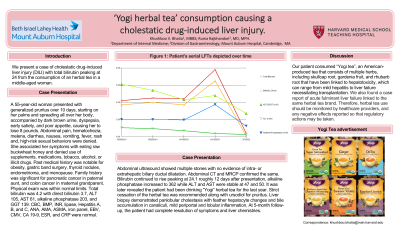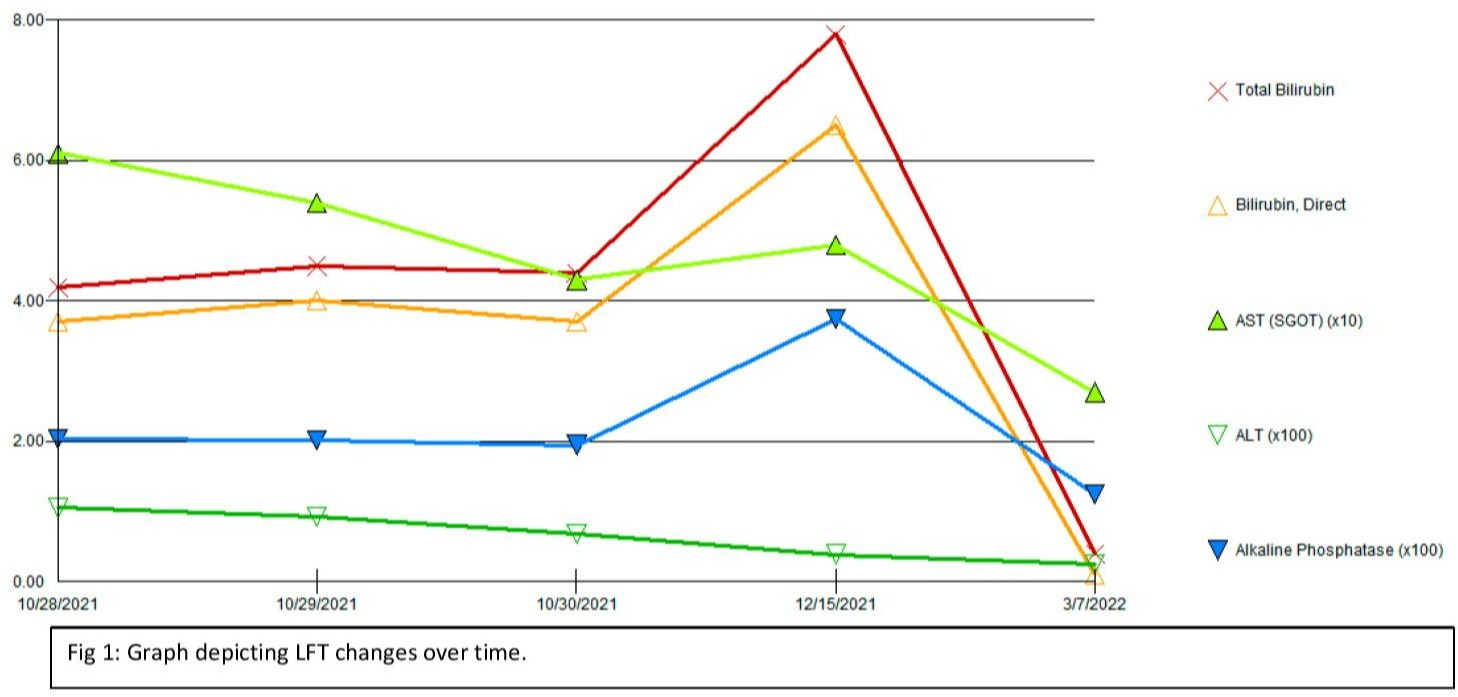Back


Poster Session A - Sunday Afternoon
Category: Liver
A0539 - ‘Yogi Herbal Tea’ Consumption Causing a Cholestatic Drug-induced Liver Injury
Sunday, October 23, 2022
5:00 PM – 7:00 PM ET
Location: Crown Ballroom

Has Audio

Khushboo V. Bhatia, MBBS
Mount Auburn Hospital
Cambridge, MA
Presenting Author(s)
Khushboo V. Bhatia, MBBS, Ruma Rajbhandari, MD, MPH
Mount Auburn Hospital, Cambridge, MA
Introduction: We present a case of cholestatic drug-induced liver injury (DILI) with total bilirubin peaking at 24 from the consumption of an herbal tea in a middle-aged woman.
Case Description/Methods: A 55-year-old woman presented with generalized pruritus over 10 days, starting on her palms and spreading all over her body, accompanied by dark brown urine, dyspepsia, early satiety, and poor appetite, causing her to lose 8 pounds. Abdominal pain, hematochezia, melena, diarrhea, nausea, vomiting, fever, rash and, high-risk sexual behaviors were denied. She associated her symptoms with eating raw buckwheat honey and denied use of supplements, medications, tobacco, alcohol, or illicit drugs. Past medical history was notable for obesity, gastric band surgery, thyroid nodules, endometrioma, and menopause. Family history was significant for pancreatic cancer in paternal aunt, and colon cancer in maternal grandparent. Physical exam was within normal limits. Total bilirubin was 4.2 with direct bilirubin 3.7, ALT 105, AST 61, alkaline phosphatase 203, and GGT 139. CBC, BMP, INR, lipase, Hepatitis A, B, and C, ANA, AMA, ASMA, iron panel, EBV, CMV, CA 19-9, ESR, and CRP were normal. Abdominal ultrasound showed multiple stones with no evidence of intra- or extrahepatic biliary ductal dilatation. Abdominal CT and MRCP confirmed the same.
Bilirubin continued to rise peaking at 24.1 roughly 12 days after presentation, alkaline phosphatase increased to 362 while ALT and AST were stable at 47 and 50. It was later revealed the patient had been drinking “Yogi” herbal tea for the last year. Strict cessation of the herbal tea was recommended along with ursodiol for pruritus. Liver biopsy demonstrated panlobular cholestasis with feather hepatocyte changes and bile accumulation in canaliculi, mild periportal and lobular inflammation. At 5-month follow-up, the patient had complete resolution of symptoms and liver chemistries.
Discussion: Our patient consumed “Yogi tea”, an American-produced tea that consists of multiple herbs, including skullcap root, gardenia fruit, and rhubarb root that have been linked to hepatotoxicity, which can range from mild hepatitis to liver failure necessitating transplantation. We also found a case report of acute fulminant liver failure linked to the same herbal tea brand. Therefore, herbal tea use should be monitored by healthcare providers, and any negative effects reported so that regulatory actions may be taken.

Disclosures:
Khushboo V. Bhatia, MBBS, Ruma Rajbhandari, MD, MPH. A0539 - ‘Yogi Herbal Tea’ Consumption Causing a Cholestatic Drug-induced Liver Injury, ACG 2022 Annual Scientific Meeting Abstracts. Charlotte, NC: American College of Gastroenterology.
Mount Auburn Hospital, Cambridge, MA
Introduction: We present a case of cholestatic drug-induced liver injury (DILI) with total bilirubin peaking at 24 from the consumption of an herbal tea in a middle-aged woman.
Case Description/Methods: A 55-year-old woman presented with generalized pruritus over 10 days, starting on her palms and spreading all over her body, accompanied by dark brown urine, dyspepsia, early satiety, and poor appetite, causing her to lose 8 pounds. Abdominal pain, hematochezia, melena, diarrhea, nausea, vomiting, fever, rash and, high-risk sexual behaviors were denied. She associated her symptoms with eating raw buckwheat honey and denied use of supplements, medications, tobacco, alcohol, or illicit drugs. Past medical history was notable for obesity, gastric band surgery, thyroid nodules, endometrioma, and menopause. Family history was significant for pancreatic cancer in paternal aunt, and colon cancer in maternal grandparent. Physical exam was within normal limits. Total bilirubin was 4.2 with direct bilirubin 3.7, ALT 105, AST 61, alkaline phosphatase 203, and GGT 139. CBC, BMP, INR, lipase, Hepatitis A, B, and C, ANA, AMA, ASMA, iron panel, EBV, CMV, CA 19-9, ESR, and CRP were normal. Abdominal ultrasound showed multiple stones with no evidence of intra- or extrahepatic biliary ductal dilatation. Abdominal CT and MRCP confirmed the same.
Bilirubin continued to rise peaking at 24.1 roughly 12 days after presentation, alkaline phosphatase increased to 362 while ALT and AST were stable at 47 and 50. It was later revealed the patient had been drinking “Yogi” herbal tea for the last year. Strict cessation of the herbal tea was recommended along with ursodiol for pruritus. Liver biopsy demonstrated panlobular cholestasis with feather hepatocyte changes and bile accumulation in canaliculi, mild periportal and lobular inflammation. At 5-month follow-up, the patient had complete resolution of symptoms and liver chemistries.
Discussion: Our patient consumed “Yogi tea”, an American-produced tea that consists of multiple herbs, including skullcap root, gardenia fruit, and rhubarb root that have been linked to hepatotoxicity, which can range from mild hepatitis to liver failure necessitating transplantation. We also found a case report of acute fulminant liver failure linked to the same herbal tea brand. Therefore, herbal tea use should be monitored by healthcare providers, and any negative effects reported so that regulatory actions may be taken.

Figure: Fig 1: Patient's serial LFTs depicted over time.
Disclosures:
Khushboo Bhatia indicated no relevant financial relationships.
Ruma Rajbhandari indicated no relevant financial relationships.
Khushboo V. Bhatia, MBBS, Ruma Rajbhandari, MD, MPH. A0539 - ‘Yogi Herbal Tea’ Consumption Causing a Cholestatic Drug-induced Liver Injury, ACG 2022 Annual Scientific Meeting Abstracts. Charlotte, NC: American College of Gastroenterology.
